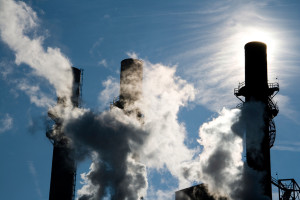
Air pollution particles from the burning of coal are far more dangerous to your health than those from other sources, a new study indicates.
Researchers analyzed data gathered from 450,000 people in 100 U.S. cities between 1982 and 2004. The team from NYU Langone Medical Center, in New York City, found that exposure to tiny particles in fossil fuel emissions are associated with an increased risk of heart disease. Fossil fuels include coal, crude oil and natural gas.
The investigators found that—pound for pound—particles from coal burning contribute about five times more to the risk of death from heart disease than other air pollution particles of the same size—less than one ten-thousandth of an inch in diameter (known as PM 2.5).
The findings were published online in the journal Environmental Health Perspectives, just as world leaders gather in Paris for the United Nations Climate Change Conference. Delegates will consider numerous ways to reduce greenhouse gas emissions.
Greenhouse gases trap heat and make the planet warmer, according to the U.S. Environmental Protection Agency. The largest source of greenhouse gas emissions in the United States is from burning fossil fuels for electricity, heat and transportation.
Air pollution kills about 3 million people worldwide each year, according to the World Health Organization. Coal emissions are a major factor in this public health crisis, the study authors said. These emissions must be reduced to lower the number of deaths caused by air pollution, the researchers said.
“Past studies of this kind have essentially assumed that all PM 2.5 particles have the same toxicity, irrespective of their source,” lead investigator George Thurston, a professor of population health and environmental medicine, said in a Langone news release.
“Our results indicate that, pound for pound, coal-burning particles contribute roughly five times as much to heart disease mortality risk as the average air pollution PM 2.5 particle in the United States,” he added.
The researchers also found that PM 2.5 particles from wind-blown soil and the burning of wood and other biomass were insignificant in terms of the risk of death from heart disease.
 /a>
/a>
 /a>
/a>
 /a>
/a>